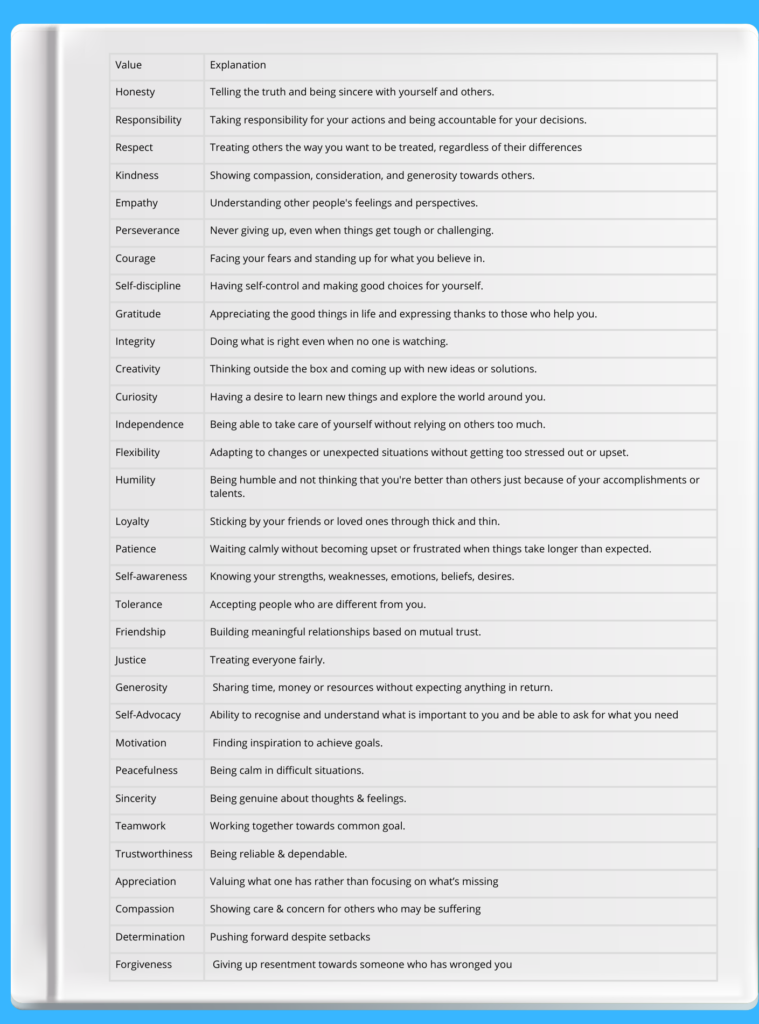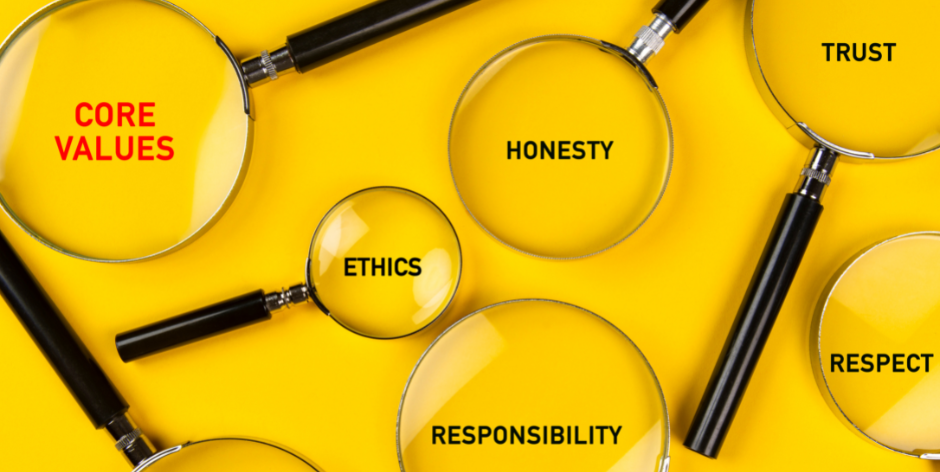As a parent of a teenager with ADHD, you may be familiar with the challenges that come with helping your teen navigate life’s ups and downs. However, one area that is often overlooked is the importance of identifying and understanding your child’s core values. And just as importantly your own.
Teens with ADHD often struggle with impulsivity, distractibility, and difficulty regulating their emotions. This can make it challenging for them to navigate the complex social and academic demands of adolescence. However, when they have a strong sense of their core values, it can provide a framework for decision-making and help them stay focused on their goals.
For example, if a teen with ADHD values creativity, they may be more likely to engage in activities that allow them to express themselves artistically or explore new ideas. Similarly, if a teen with ADHD values resilience, they may be better equipped to cope with setbacks or challenges that arise in school or social situations.
Identifying and understanding core values can help teens with ADHD develop a stronger sense of self-awareness. This could lead to increased self-confidence and a greater sense of purpose in life. It can also provide parents with valuable insights into their child’s unique strengths and qualities, allowing them to offer support and guidance that is tailored to their individual needs.
Core values are the guiding principles that define who we are as individuals, shaping our beliefs, behaviors, and decision-making processes.
In this blog article, we’ll explore the concept of core values for teens with ADHD and how parents can benefit from knowing about them. We’ll discuss what core values are, why they matter for young people with ADHD, and strategies for identifying them. By the end of this article, you’ll have a better understanding of how to support your child in developing their unique strengths and qualities while building a stronger relationship based on mutual respect and understanding.

Core values are the fundamental beliefs and principles that guide our behavior, actions, and decisions. They represent what we stand for, what is important to us, and what motivates us in life. Core values are deeply ingrained and typically do not change over time.
In contrast, regular values may be more situational and subject to change based on context or circumstances. For example, someone may value punctuality in a work setting but prioritize flexibility when spending time with friends.
For teens with ADHD, some core values that may be particularly relevant include:
Creativity: Valuing creativity can help teens with ADHD channel their hyperactivity into productive outlets such as art or music. It can also encourage them to think outside the box when problem-solving.
Resilience: Building resilience can help teens with ADHD bounce back from setbacks or failures and develop a growth mindset. This can lead to increased self-confidence and perseverance in the face of challenges.
Adaptability: Valuing adaptability can help teens with ADHD learn to adjust to new situations or changes in routine more easily. It can also foster greater flexibility in thinking and problem-solving skills.
Other examples of core values that may be relevant for teens with ADHD include kindness, honesty, curiosity, independence, and self-discipline. By identifying their core values, teens with ADHD can develop a greater sense of purpose and direction in life while also building important life skills such as self-awareness and decision-making abilities.
Values and goals are often used interchangeably, but they actually refer to different things. Values are guiding principles or beliefs that shape how we live our lives, whereas goals are specific outcomes we want to achieve.
Values represent what is most important to us in life – they reflect our deepest desires, aspirations, and priorities. For example, someone might value honesty, compassion, or creativity. Values provide a sense of direction and purpose in life, guiding our decisions and actions in different domains (e.g., relationships, work, hobbies).
Goals, on the other hand, are specific targets or objectives we want to accomplish within a certain timeframe. They are often measurable and concrete (e.g., running a marathon within 6 months), and can be broken down into smaller steps or milestones. Goals can be aligned with our values (e.g., setting a goal to spend more time with family if we value connection), but they can also be unrelated or even at odds with our values.
It’s important to help your teenager distinguish between values and goals so that they can align their behavior with what truly matters to them. By identifying core values and using them as a compass for decision-making and action-planning it may help them as they begin to seek out and develop their identity. Goals can then become tools for achieving valued outcomes rather than ends in themselves.

Identifying and understanding core values can bring a number of benefits, particularly for teens with ADHD. Here are some of the ways that knowing your teen’s core values can help:
Knowing about your own and your teen’s core values can have a positive impact on your nervous systems by reducing stress and promoting feelings of calm and relaxation. This is because when we are living in alignment with our core values, we are more likely to feel fulfilled, motivated, and purposeful. This sense of purpose and meaning can help reduce anxiety and promote a sense of well-being.
Better understanding: Knowing your teen’s core values can help you better understand their motivations, interests, and priorities. This can lead to more effective communication and a stronger parent-child relationship.
Improved decision-making: When teens have a clear sense of their core values, it can provide a framework for decision-making. They are more likely to make choices that align with their values and avoid actions or behaviors that conflict with them.
Increased self-awareness: Identifying their own core values can help teens develop greater self-awareness and a stronger sense of identity. This can lead to increased confidence, self-esteem, and resilience.
Enhanced problem-solving skills: Understanding core values can help teens approach problems or challenges from a more thoughtful and intentional perspective. They may be better equipped to identify creative solutions or alternative approaches.
As a parent or caregiver of a teen with ADHD, taking the time to discuss and explore core values together can be an opportunity to strengthen your relationship while also supporting your child’s growth and development. By understanding what matters most to them, you can offer guidance and support that is tailored to their unique needs and interests.
Here are five strategies for identifying core values in teens:
Observe behavior: Pay attention to your teen’s actions and behaviors, as these can provide clues about their priorities and interests. For example, if they spend a lot of time volunteering or helping others, it may suggest that they value kindness or empathy.
Ask gently & directly: Engage your teen in conversation about their beliefs and what matters most to them. Ask open-ended questions such as “What do you care about?” or “What motivates you?” to encourage reflection and self-discovery.
Take personality tests: Personality tests such as the Myers-Briggs Type Indicator or the Enneagram can help identify core values by highlighting individual strengths, weaknesses, and preferences.
Encourage journaling: Encourage your teen to keep a journal where they can reflect on their thoughts and feelings. This can be a helpful tool for exploring personal values and gaining greater self-awareness.
Explore hobbies and interests: Consider the activities that your teen enjoys most, as these can be an indication of what is important to them. For example, if they love playing sports, it may suggest that they value teamwork or competition.
To encourage your teen to explore their own core values, consider providing opportunities for self-reflection and exploration. This could include encouraging them to try new activities or experiences, offering support for creative projects or pursuits, or simply creating space for open dialogue and reflection.
In conclusion, identifying and understanding your teen’s core values can have a number of benefits for both the parent and child. Knowing about your own and your teen’s core values can help regulate the nervous system by promoting emotional regulation, reducing stress, improving overall well-being with less family blowouts.
It can lead to better communication, stronger relationships, increased self-awareness, improved decision-making skills, and enhanced problem-solving abilities. By taking the time to explore your teen’s unique qualities and strengths, you can offer guidance and support that is tailored to their individual needs and interests. As a parent or caregiver, it’s important to encourage open dialogue and reflection so that your teen can continue to grow and develop as they navigate the challenges of adolescence.


With a passion for improving the emotional wellbeing of young people, adults and parents, she is the founder and creator of Polyvagal Teen®, she has developed an innovative approach to helping teens recognise and manage stress and anxiety through becoming “Polyvagal Aware”. In addition, Yasmin is also the founder of World Let’s Stop Shouting Day, which aims to promote peaceful communication and reduce conflict and aggression in our daily interactions. Neurosloth™ and The Hearts Whisper®
She also runs a small private practice providing counselling and neurofeedback to young people and adults in North Yorkshire.
